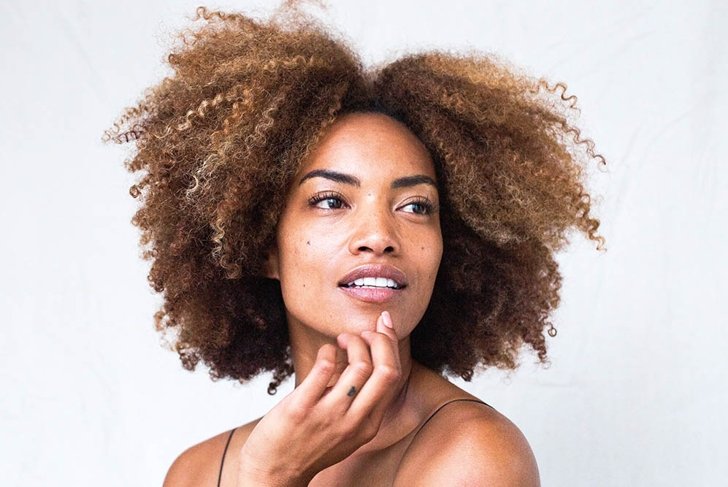
Contrary to what we’re taught to believe, aging skin can be beautiful skin. These days, more and more women are interested in ditching the surgeries and injectables and instead focusing on a healthy lifestyle and natural, nourishing products. Although skin aging is inevitable, there are a variety of factors that we can control to improve the appearance and health of skin.
01
Eat well
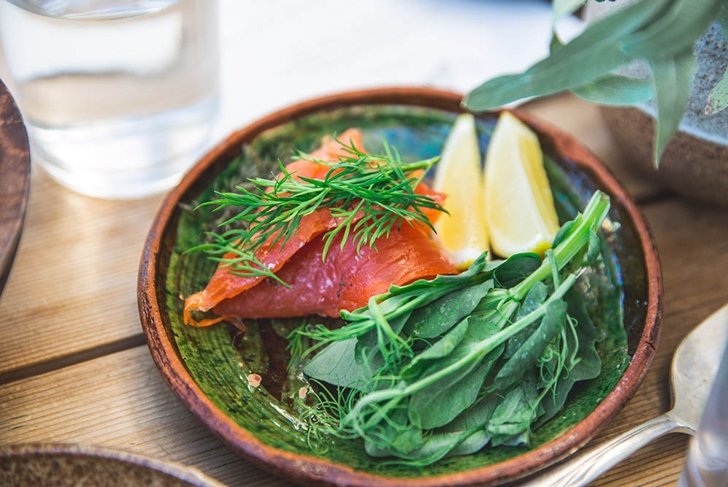 Do: eat a diet full of vegetables, healthy fats, vitamins, and minerals. In particular, salmon, walnuts, and flaxseed deliver essential fatty acids such as omega-3 for plumper, younger-looking skin. Speak with your health care practitioner if you think you may not be getting enough vitamins or minerals. Supplementation may be an option.
Do: eat a diet full of vegetables, healthy fats, vitamins, and minerals. In particular, salmon, walnuts, and flaxseed deliver essential fatty acids such as omega-3 for plumper, younger-looking skin. Speak with your health care practitioner if you think you may not be getting enough vitamins or minerals. Supplementation may be an option.
Don’t: drink too much alcohol. It can be dehydrating, and damaging to our skin. Also, don’t smoke. In addition to being terrible for our health, it can wreak havoc on our complexions.
02
Exercise proper sun safety
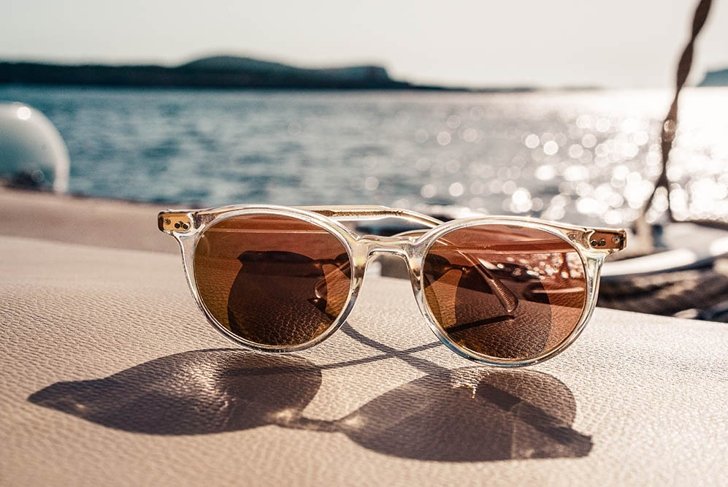 Do: wear sunglasses. In addition to protecting our eye health, they can help reduce squinting and therefore—wrinkle formation.
Do: wear sunglasses. In addition to protecting our eye health, they can help reduce squinting and therefore—wrinkle formation.
Don’t: tan. Tanning beds, like the sun, emit harmful UV rays. Also, avoid spending excessive time in chlorinated pools and hot tubs. Chlorine can cause wrinkles, and high temperatures exacerbate this effect.
03
Sweat it out
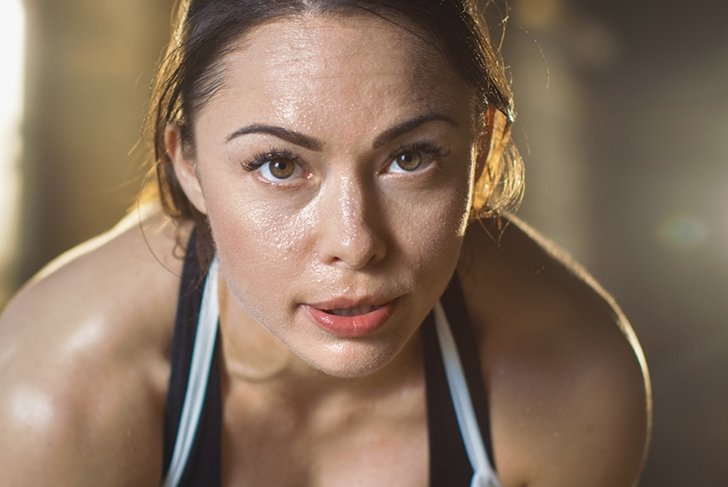 Do: work out. Exercise can boost circulation, helping improve the appearance of our skin. In fact, one study found that regular exercisers over the age of 40 had skin resembling that of 20- and 30-year-olds.
Do: work out. Exercise can boost circulation, helping improve the appearance of our skin. In fact, one study found that regular exercisers over the age of 40 had skin resembling that of 20- and 30-year-olds.
Don’t: wear makeup when you work out. After exercise, don’t forget to wash your face with a gentle cleanser. Sweat irritates our skin.
04
Make sleep a priority
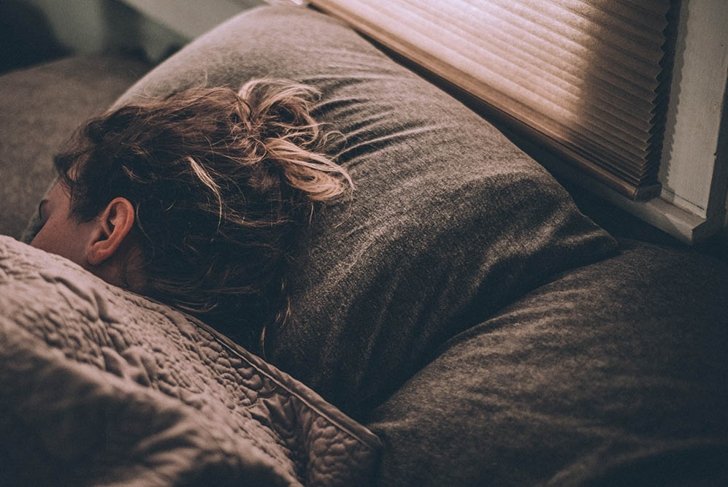 Do: go to bed early. The duration of your sleep affects your skin quality. Several studies have revealed that sleep deprivation can disturb skin barrier function, and because it deprives the immune system, collagen production may be affected.
Do: go to bed early. The duration of your sleep affects your skin quality. Several studies have revealed that sleep deprivation can disturb skin barrier function, and because it deprives the immune system, collagen production may be affected.
Don’t: bury your face in your pillow when you sleep. Many people don’t realize that they can develop facial wrinkles by sleeping in this position. A simple solution to this, if found comfortable, is to train yourself not to sleep prone (on your stomach).
05
Skin care products: know your A, B, Cs
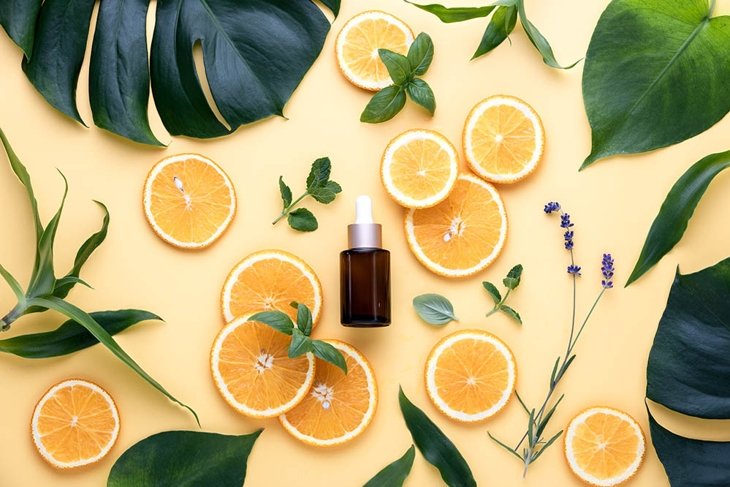 Do: use products with B vitamins, and vitamins C and E. These skin-loving vitamins have antioxidant (and therefore, antiaging) effects.
Do: use products with B vitamins, and vitamins C and E. These skin-loving vitamins have antioxidant (and therefore, antiaging) effects.
Don’t: use products with vitamin A or retinols. Although part of a healthy diet, vitamin A may not be safe on our skin. Research suggests that it can increase skin sensitivity and cause DNA damage.
06
Choose soothing products
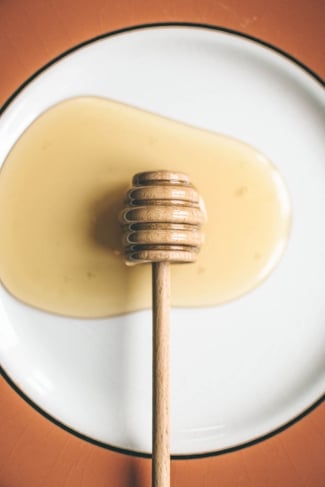 Do: use honey. If you’re not already convinced of honey’s superpowers, you may be surprised to learn it may slow wrinkle formation. Plus, it’s soothing, moisturizing, and even antibacterial.
Do: use honey. If you’re not already convinced of honey’s superpowers, you may be surprised to learn it may slow wrinkle formation. Plus, it’s soothing, moisturizing, and even antibacterial.
Don’t: use products that burn or sting. The mantra “beauty is pain” doesn’t apply to skin products. Burning doesn’t mean the product is working—it means that it’s irritating your skin.
07
Antioxidants
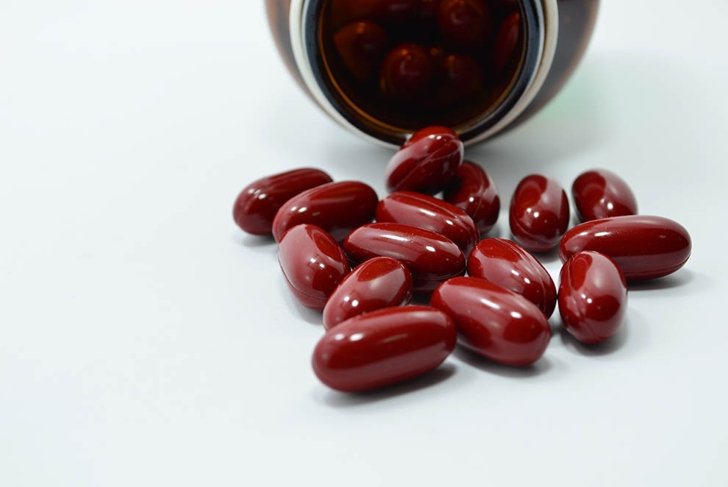 Do: use products with antioxidant ingredients like green tea, resveratrol, and coenzyme Q10 (CoQ10). Green tea polyphenols are thought to help protect skin from the damaging effects of the sun. Resveratrol and CoQ10 are seen by researchers as promising in the prevention of skin aging.
Do: use products with antioxidant ingredients like green tea, resveratrol, and coenzyme Q10 (CoQ10). Green tea polyphenols are thought to help protect skin from the damaging effects of the sun. Resveratrol and CoQ10 are seen by researchers as promising in the prevention of skin aging.
Don’t: stop a product that doesn’t seem to work overnight. Products can take anywhere from six weeks to three months to work.
08
Use moisturizing acids
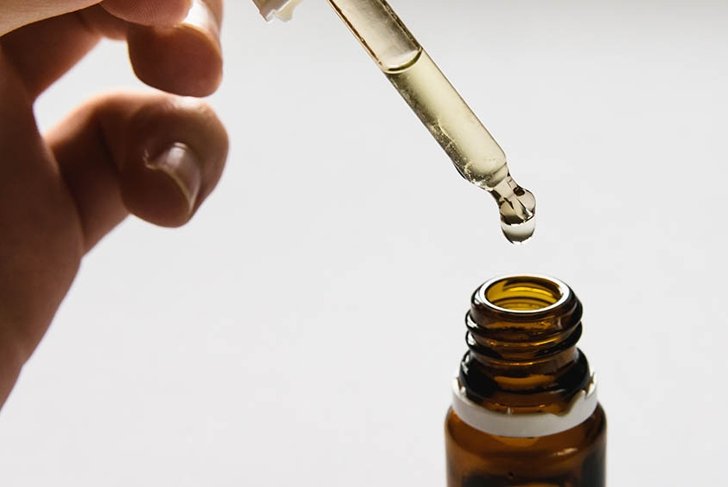 Do: Use products containing hyaluronic acid. This ingredient helps skin retain water, keeping it plump and youthful looking.
Do: Use products containing hyaluronic acid. This ingredient helps skin retain water, keeping it plump and youthful looking.
Don’t: use acids such as alpha and beta hydroxy acids. Commonly used as exfoliants, these ingredients can increase skin’s sensitivity to the sun.
09
Makeup for aging skin: lighten up on foundation
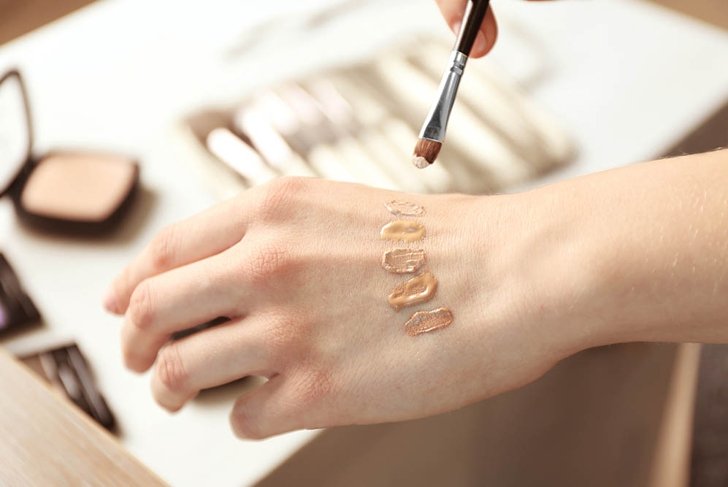 Do: look for light formulations when choosing a foundation or tinted moisturizer. These won’t settle into fine lines and wrinkles.
Do: look for light formulations when choosing a foundation or tinted moisturizer. These won’t settle into fine lines and wrinkles.
Don’t: cake it into the skin. Apply foundation or tinted moisturizer gently and loosely.
10
Use the right makeup
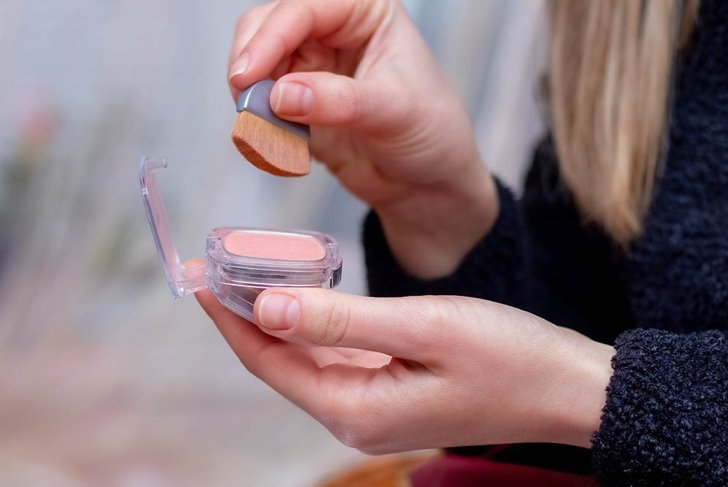 Do: use blush powder (not cream). Dust it lightly onto skin to avoid rubbing. For lip makeup, use a lipstick-setting cream, as well as a cream (not matte) lipstick. A cream lipstick will keep lips hydrated better than a matte finish.
Do: use blush powder (not cream). Dust it lightly onto skin to avoid rubbing. For lip makeup, use a lipstick-setting cream, as well as a cream (not matte) lipstick. A cream lipstick will keep lips hydrated better than a matte finish.
Don’t: use a lip pencil. To avoid lipstick bleeding, use a stiff brush to apply lipstick-setting cream before lipstick. This is thought to work better than a traditional lip pencil.
11
Facial massage for stress relief
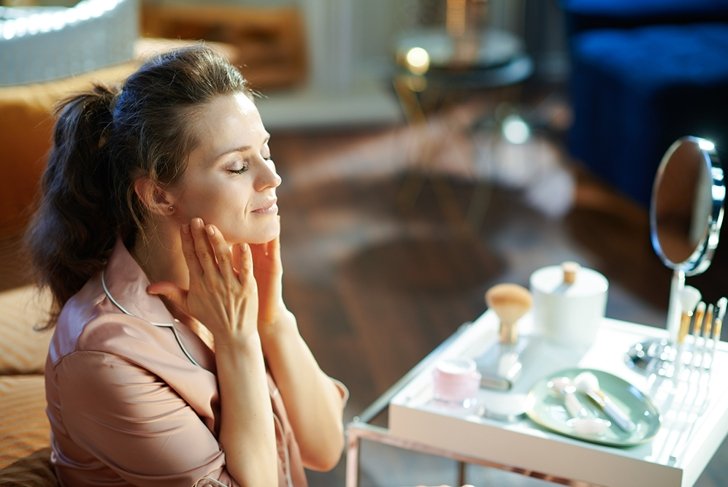 Do: try facial massage to soothe tired facial muscles and unwind. Research also backs it up: massaging our faces can reduce our anxiety and boost our moods.
Do: try facial massage to soothe tired facial muscles and unwind. Research also backs it up: massaging our faces can reduce our anxiety and boost our moods.
It’s easy to give yourself an at-home facial massage.
- Apply your favourite facial oil. Many natural blends are available. Otherwise, pure argan oil or jojoba oil work well. Aging skin is dry skin, so don’t be afraid of using oils.
- In firm, circular motions, pushing your skin up and out (not down), massage your lymph nodes (under your throat and along your jawline), your cheeks, and your temples.
- Gently massage your eye area, making sure not to get the oil in your eyes.
- Massage your forehead by making a zigzag horizontal motion (the opposite direction of wrinkles).
Don’t: forget to cleanse your face before doing a facial massage. There’s no benefit to massaging dirt and old makeup into your skin!
12
What about age spots?
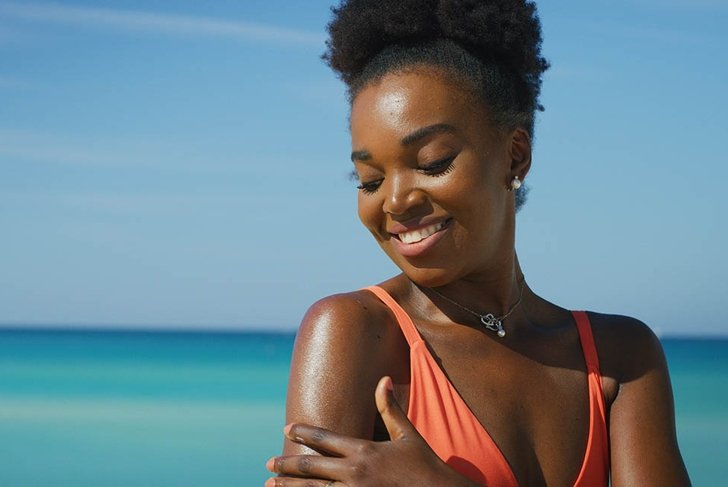 Do: wear a high-quality natural mineral sunscreen made from zinc oxide or titanium dioxide. This helps prevent age spots. Often called liver spots, age spots have nothing to do with the liver. They are associated with aging skin, but they may have more to do with UV exposure, as they tend to appear on parts of the body that have had the highest amount of sun exposure—such as the backs of the hands, face, and shoulders.
Do: wear a high-quality natural mineral sunscreen made from zinc oxide or titanium dioxide. This helps prevent age spots. Often called liver spots, age spots have nothing to do with the liver. They are associated with aging skin, but they may have more to do with UV exposure, as they tend to appear on parts of the body that have had the highest amount of sun exposure—such as the backs of the hands, face, and shoulders.
Don’t: be confused by sun protection factor (SPF) ratings. Stick with SPF30 sunscreen, which blocks 97 percent of sunburn-causing rays. Sunscreens with higher SPFs block little, if any, more UVB radiation than that. Extremely high SPFs can lead people to believe they are better protected than they are and that they can stay out longer in the sun, thus increasing damaging UV exposure.













